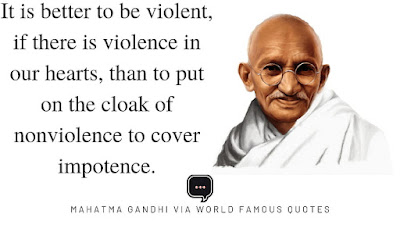Mahatma Gandhi, the revered leader of India's independence movement, continues to inspire the world with his unwavering commitment to nonviolence, truth, and social change.
 |
| source: pxfuel |
Born on October 2, 1869, in Porbandar, Gujarat, Gandhi's life was a testament to his belief in the transformative power of love, compassion, and moral integrity.
This article explores the intricate facets of Gandhi's philosophy, delving into his early life, the evolution of his beliefs, the impact of his teachings on the global stage, and the enduring legacy that shapes our world today.
Early Life and Formative Influences
Growing up in a deeply religious household, Gandhi imbibed the principles of Hinduism, Jainism, and later, Christianity. His mother, Putlibai, deeply influenced his moral compass, instilling in him the values of honesty, humility, and empathy.
These formative years shaped Gandhi's character and laid the foundation for his future endeavors as a social reformer. His early exposure to the doctrines of nonviolence and truth sowed the seeds of his revolutionary ideology.
Educational Pursuits and Awakening
In 1888, Gandhi traveled to London to study law, a journey that exposed him to the harsh realities of racial discrimination prevalent in the colonial era.
The experiences of racism and prejudice he faced in England deeply affected him, sparking a profound sense of empathy for the marginalized and oppressed. Gandhi's encounters with injustice served as a catalyst for his social awakening, propelling him into the realm of social activism and nonviolent resistance.
The Philosophy of Nonviolence
Central to Gandhi's philosophy was the concept of Ahimsa, or nonviolence, which he regarded as the ultimate form of strength and moral courage. Ahimsa, for Gandhi, was not merely the absence of physical violence but a comprehensive principle that encompassed love, understanding, and compassion for all living beings.
Gandhi believed that nonviolence was not passive resistance but an active force that had the power to transform hearts and societies. Through Ahimsa, he aimed to awaken the inherent goodness in humanity, fostering an environment where justice and peace could thrive.
Satyagraha: The Power of Truth
Gandhi further developed the concept of nonviolent resistance into Satyagraha, a term that embodies the essence of "truth force" or "soul force." Satyagraha was a method of nonviolent resistance that relied on truth, moral integrity, and unwavering determination.
Gandhi applied Satyagraha in various movements, including the Salt March and the Quit India Movement, demonstrating the effectiveness of nonviolent protest in challenging oppressive regimes and unjust laws. His ability to galvanize the masses through the power of truth became a defining feature of his leadership.
Self-Reliance and Swadeshi Movement
Gandhi was a staunch advocate of self-reliance and economic independence for India. He propagated the Swadeshi movement, urging Indians to produce and use locally made goods instead of relying on imported products.
This movement not only bolstered the Indian economy but also empowered local communities, artisans, and craftsmen. Gandhi's emphasis on self-sufficiency laid the foundation for India's economic policies post-independence, fostering a sense of national pride and unity among the people.
Legacy and Global Impact
Mahatma Gandhi's legacy extends far beyond the borders of India, transcending cultures, religions, and generations. His teachings on nonviolence, truth, and social justice have inspired leaders, activists, and ordinary individuals across the globe.
The American civil rights movement, led by Martin Luther King Jr., drew heavily from Gandhi's principles, shaping the movement's strategies and objectives.
Gandhi's birthday, October 2nd, is commemorated internationally as the International Day of Non-Violence, underscoring his enduring influence on global peace and social change.
Conclusion
Mahatma Gandhi's life and teachings continue to resonate profoundly in our world, reminding us of the transformative power of nonviolence, truth, and moral integrity. His legacy challenges us to confront injustice with courage, compassion, and unwavering determination.
As we reflect on his extraordinary journey, let us embrace the principles he stood for and work collectively to create a world where nonviolence, truth, and social justice prevail.
In honoring Gandhi's legacy, we pave the way for a more harmonious, equitable, and compassionate future for generations to come. Through our collective efforts, we can ensure that his ideals echo across the ages, inspiring positive change in our world.
As we strive to build a society rooted in nonviolence and truth, we uphold the timeless legacy of Mahatma Gandhi, fostering a world where love and understanding triumph over hatred and discord.
In the spirit of Gandhi's teachings, let us continue our journey toward a better, more compassionate world, guided by the principles of nonviolence, truth, and social transformation.
Written By- Tanya Aggarwal
(This article has been authored exclusively by the writer and is being presented on Eat My News, which serves as a platform for the community to voice their perspectives. As an entity, Eat My News cannot be held liable for the content or its accuracy. The views expressed in this article solely pertain to the author or writer. For further queries about the article or its content you can contact this email address - tanyaaggarwal132@gmail.com)








.jpeg)


0 Comments